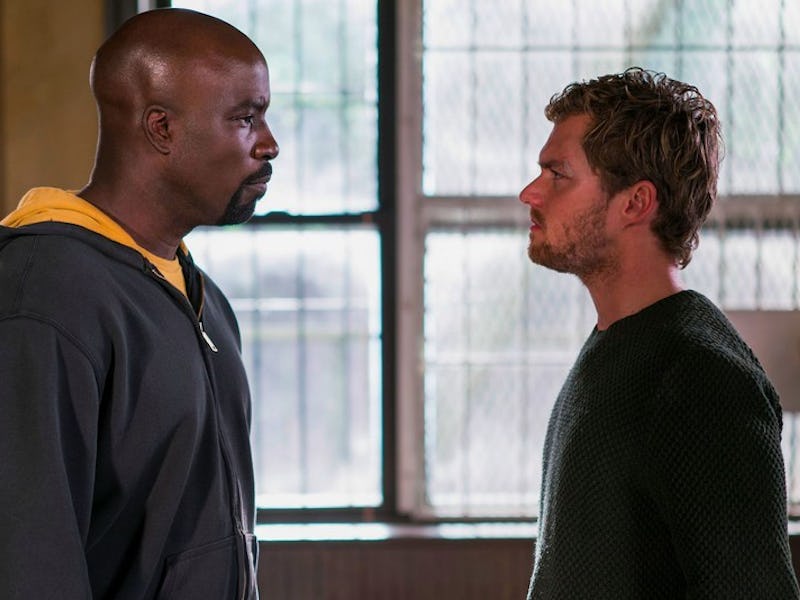Iron Fist Is Actually Bearable in 'The Defenders' for One Reason
Luke Cage is the sole reason Danny Rand starts to take responsibility for his privilege in Netflix's 'The Defenders.'

Danny Rand’s Iron Fist and Luke Cage are best friends in Marvel’s comics, but that doesn’t mean they were destined to get along from the very beginning of Netflix’s The Defenders. In fact, Luke (Mike Colter) has a greater impact on Danny (Finn Jones) than most fans might realize; and, by the time Season 2 of Iron Fist rolls around, Danny could be a much better person.
Luke forced Danny to confront his privilege, something that no one else in his life has ever managed up until this point.
In Episode 3 of Netflix’s The Defenders, “Worst Behavior,” actual angel Claire Temple takes Colleen Wing and leaves Luke and Danny alone in a room together to hash out their problems.
“The two of you trust me,” Claire says. “So, please, listen when I say, you’re on the same side.”
While Danny and Luke’s conversation starts out friendly as the two laugh about dragons and try to explain their lives to each other, things quickly turn ugly when Danny accuses Luke of “not thinking about the bigger picture.” Luke’s only concerned about protecting the people in his neighborhood and implies Danny doesn’t know anything about the world.
“You know nothing about me,” Danny says, the two men standing up to get in each other’s faces.
“I know enough,” Luke replies. “And I know privilege when I see it. You may think you earned your strength, but you had power the day you were born. Before the dragons, before the chi, you had the ability to change the world without getting anybody hurt.”
Danny says, coolly, “These people won’t be stopped that way.”
“Oh, so you’re taking the war to the ones at the bottom, is that it?” Luke asks. “If I were in your shoes, I’d think twice about using that thing” — he glances at Danny’s hand, “— on people who are trying to feed their families.”
And Danny, thoroughly kowtowed, averts his gaze as Luke gathers his things and leaves.
Here’s why this scene is a huge deal.
The first season of Iron Fist resulted in a lot of backlash from both the media and Marvel fans alike. Not only was Danny dubbed boring and a bit dumb, but the word “whitewashing” was used to describe the character, a lot. This got many people riled up and resulted in countless hateful Reddit comments and Facebook notifications.
And, to be fair, those commenters were right. In the context of Marvel’s Netflix show Iron Fist, whitewashing doesn’t technically apply. Danny Rand is, canonically in Marvel’s comics, an incredibly rich and powerful white man, who, as a child, found himself taken in by the mystical monks of K’un-Lun, learned kung fu, and returned to his country of origin with all these mystical powers.
The Netflix show did not whitewash Danny Rand because the character of Iron Fist was already whitewashed before Netflix decided to make a television series. That’s the problem.
See, Roy Thomas first created Danny Rand’s Iron Fist back in the 1970s, taking inspiration from kung fu films and attempting to adapt them for Marvel’s audience, which, to him and the comics company, meant adapting them for a white, American audience. That was widely accepted as an okay thing at the time, but in 2017, people have a bit more concern for the world around them. We live, to a degree, in a much more global, empathetic society.
This whitewashing — on top of the character’s personality and the general tone and pacing of Iron Fist Season 1 — resulted in a lot of people really not liking Danny Rand or his introduction into the MCU. So, while a lot of Marvel fans were psyched to see Luke Cage, Jessica Jones, and Matt Murdock’s Daredevil teaming up to take down bad guys in The Defenders, Danny turned into a bit of a joke.
Fans were expecting the rest of the Defenders to put Danny in his place.
Look at this doofus.
The Defenders acknowledged all this controversy in a bit of a roundabout way; the other three Defenders roll their eyes at Danny’s inflated optimism, Stick (Scott Glenn) mocks him at every turn, and people generally treat him like the kid he so often proves himself to be. It almost felt like the writers were acknowledging people’s complaints by forcing Danny to acknowledge his own privilege and whiteness, and by subjecting Danny to, well, a lot of beatings in The Defenders.
But the aforementioned scene in the third episode between Danny and Luke is by far the biggest beating. Rather than poke fun at Danny’s character, it challenges him to be a better, more mindful person.
Up to that point, no one had challenged Danny, since he regained his life as a billionaire white boy who can frankly get away with whatever he wants. Yes, he had a hard life while living among the monks in K’un-Lun, but that doesn’t blot out who he is once he returns to New York City. Danny has all of these gifts that he gained through his hardship — no one’s denying that — but that hardship doesn’t lessen his privilege.
Luke’s entire character arc has been about helping the people in his neighborhood, rising above stereotypes while still remaining true to himself, and becoming a better person. Danny could learn a lot from him.
And, luckily, in The Defenders Danny does starts listening to the people around him — and it’s all because of Luke’s comments.